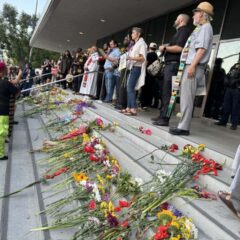June 10, 2020
2:00 p.m. – 3:00 p.m. EDT
Location: Online Zoom Webinar
Throughout the United States and in cities across the world thousands have joined protests over the murder of George Floyd by a police officer in Minneapolis, Minnesota. The protests have called for an end to systemic racism and police brutality. Religious leaders have stepped up in solidarity with these calls, using texts from their faith traditions to oppose violence and oppression of black Americans. Many faith communities are beginning to explore how they might get more involved in preventing excessive use of force by police and reforming the criminal justice system.
In this conversation, faith leaders reflected on how Floyd’s death has influenced their communities. They were joined by religious scholars to discuss the ways in which local police departments interact with religious communities, as well as how religious communities might get involved in demilitarizing and training police. The event built upon a history of faith and criminal justice work and considered what lines of research and practice might prove useful in abolishing the use of excessive force by police.
Najuma Smith-Pollard, program manager of the USC Cecil Murray Center for Community Engagement, reflected on why Floyd’s death has become a landmark moment in the decades-long struggle against police brutality. Here is what she said:
A number of people would characterize this moment as the perfect storm… You have a triple pandemic. You have the COVID pandemic that forced people indoors, off work, which then creates an economic crisis for millions of people. And then you layer that with these egregious violence against, yet again, another black man screaming, “I can’t breathe.” We’ve seen these videos before. This is not the worst one, this is just bad. This is all bad. One is not worse than the other. But it was just too many forces coming together at one time, and everybody I believe felt vulnerable in the way in which this crime happened. And to hear this man cry out for nearly nine minutes in the way that he did, it just pulled something back. Like it was the final tipping point.
This event was co-sponsored by Georgetown University’s Berkley Center for Religion, Peace, and World Affairs and the University of Southern California’s Center for Religion and Civic Culture.



